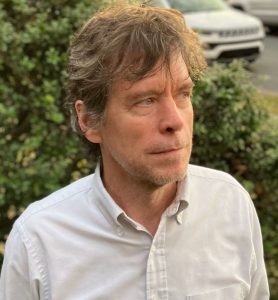
I was a townie. She was a college girl picking up weekend shifts at the diner. She told me I wouldn’t believe what textbooks cost. She told me about her semester abroad, the cathedrals and battlefields. A dig where she unearthed a coin from the days of Augustus. Histories so deep she felt them. “Right here,” she said, a hand laid over her heart. Our first kiss behind the alley dumpster after we lugged out the night’s trash. Her watermelon gum pinched from between her lips and stuck to the dumpster’s metal. She smiled, then—as she drew closer—another expression, one that made me forget the cold. I’d been kissed before, but only by town girls. Kisses that didn’t taste like watermelon. Kisses that—beneath their wetness and curiosity—carried a hint of the earth we shared. Our tangled roots. The graveyards littered with the stones of our kin.
“Show me the things I’ve never seen,” she said. So, we hiked to the cave where another generation’s bootleggers hid their stash. I introduced her to the Grange’s demolition derby, which she loved, and the rod-and-gun club’s tripe, which she didn’t. Along the river’s muddy bank, we dug for arrowheads. We never found any, but she didn’t mind. The thrill, she said, was in the searching. In the forgetting of a hundred thousand disappointments—and in the belief something beautiful might be waiting just beyond her next breath.
The windows in her attic apartment rattled when the winds blew in from the fields. Cocooned beneath every blanket she owned, feeling more weight than warmth, we wove hazy narratives of a life beyond this town. The places she wanted to see. Pompeii. Easter Island. Machu Picchu. The languages she spoke and the others she was learning. The parents who’d always bail her out with a plane ticket home. Sometimes, as she slept, I flipped through her books. History. World religions. The blur of margin notes and highlighted passages. And sometimes I wrapped a blanket over my shoulders and sat by the window. My forehead resting against the cold glass while the snow buried everything I knew.
She left of course. That’s what travelers do. They board planes. They drive into the sunset, and when they look back, their windows become frames, pictures of what once was. I’ve been with other girls since, but in my unclaimed moments, I think of her, a paper doll posed before a thousand imagined lives, each shinier than mine.
Summer brings its heat and storms and the county fair, and come August, as the nights’ thrum ebbs from the cicadas to the crickets, the students return. The highlight of that first weekend is the freshman walk. The cops block off Main Street, and the shops hand out their merch, and the guides stop at their designated spots to share local folklore. The band plays the alma mater and the fight song, and the drumline’s jagged pulse echoes along the brick and glass.
I laze by the diner window, watching the girls, my eyes losing focus the way they do when I sit along the sun-dappled river. The manager tells me to quit my daydreaming and take out the trash. Heat from the alley’s macadam, the rush of flies when I open the dumpster’s lid, but after I toss in my bags, I pause. On the dumpster’s side, her gum, a fossil dulled by sun and rain, and when I touch its ridges, I think about all the places I’ll never see. And I think about a first kiss and a taste I believed was watermelon, but which was really goodbye.
Curtis Smith grew up in Ardmore. He has published over 125 stories and essays and thirteen books. His latest novel, The Magpie’s Return, was named a Kirkus Indie pick of the year in 2020. His next novel, The Lost and the Blind, will be released this fall.